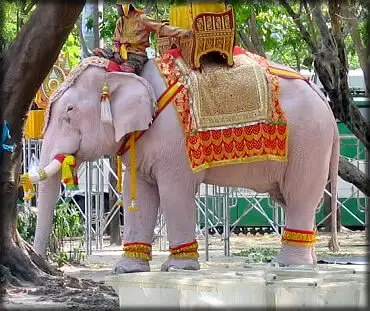Originally ‘white elephants’ were simply that – elephants that were white. Later, the expression came to mean ‘a burdensome possession – one that is more trouble than it is worth’. More recently, the term has also been used to describe any doomed enterprise, on which large sums of money are spent and which is then abandoned.
A white elephant
What's the meaning of the phrase 'A white elephant'?
What's the origin of the phrase 'A white elephant'?
White (albino) elephants were regarded as holy in ancient times in Thailand and other Asian countries. Keeping a white elephant was a very expensive undertaking, since the owner had to provide the elephant with special food and provide access for people who wanted to worship it. If a Thai King became dissatisfied with a subordinate, he would give him a white elephant. The gift would, in most cases, ruin the recipient.
References to Indian and Thai veneration of white elephants dates back to at least the early 17th century. The first reference in English to the idiomatic meaning of the term ‘white elephant’ comes in 1851 G. E. Jewbury’s Letters, 1892:
“His services are like so many white elephants, of which nobody can make use, and yet that drain one’s gratitude, if indeed one does not feel bankrupt.”
Related articles
Related phrases and meanings
Browse more Phrases
About the Author

Phrases & Meanings
A-Z
A B C D E F G H I J K L M N O P Q R S T UV W XYZ
Categories
American Animals Australian Bible Body Colour Conflict Death Devil Dogs Emotions Euphemism Family Fashion Food French Horses ‘Jack’ Luck Money Military Music Names Nature Nautical Numbers Politics Religion Shakespeare Stupidity Entertainment Weather Women Work
